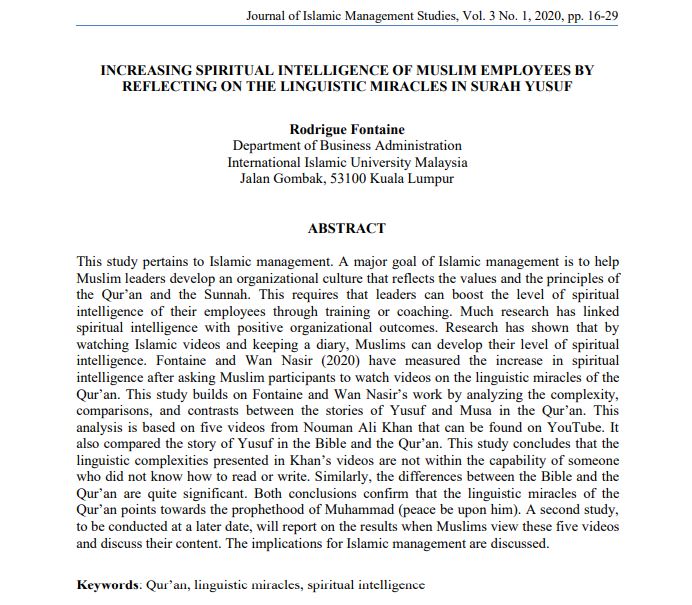INCREASING SPIRITUAL INTELLIGENCE OF MUSLIM EMPLOYEES BY REFLECTING ON THE LINGUISTIC MIRACLES IN SURAH YUSUF
Abstract
This study pertains to Islamic management. A major goal of Islamic management is to help Muslim leaders develop an organizational culture that reflects the values and the principles of the Qur’an and the Sunnah. This requires that leaders can boost the level of spiritual intelligence of their employees through training or coaching. Much research has linked spiritual intelligence with positive organizational outcomes. Research has shown that by watching Islamic videos and keeping a diary, Muslims can develop their level of spiritual intelligence. Fontaine and Wan Nasir (2020) have measured the increase in spiritual intelligence after asking Muslim participants to watch videos on the linguistic miracles of the Qur’an. This study builds on Fontaine and Wan Nasir’s work by analyzing the complexity, comparisons, and contrasts between the stories of Yusuf and Musa in the Qur’an. This analysis is based on five videos from Nouman Ali Khan that can be found on YouTube. It also compared the story of Yusuf in the Bible and the Qur’an. This study concludes that the linguistic complexities presented in Khan’s videos are not within the capability of someone who did not know how to read or write. Similarly, the differences between the Bible and the Qur’an are quite significant. Both conclusions confirm that the linguistic miracles of the Qur’an points towards the prophethood of Muhammad (peace be upon him). A second study, to be conducted at a later date, will report on the results when Muslims view these five videos and discuss their content. The implications for Islamic management are discussed.

The Journal of Islamic Management Studies is copyrighted by WAIM, as publisher and authors, as contributors. Due acknowledgement is necessary for using any published materials through writing to the Chief Editor or Editorial Board.





